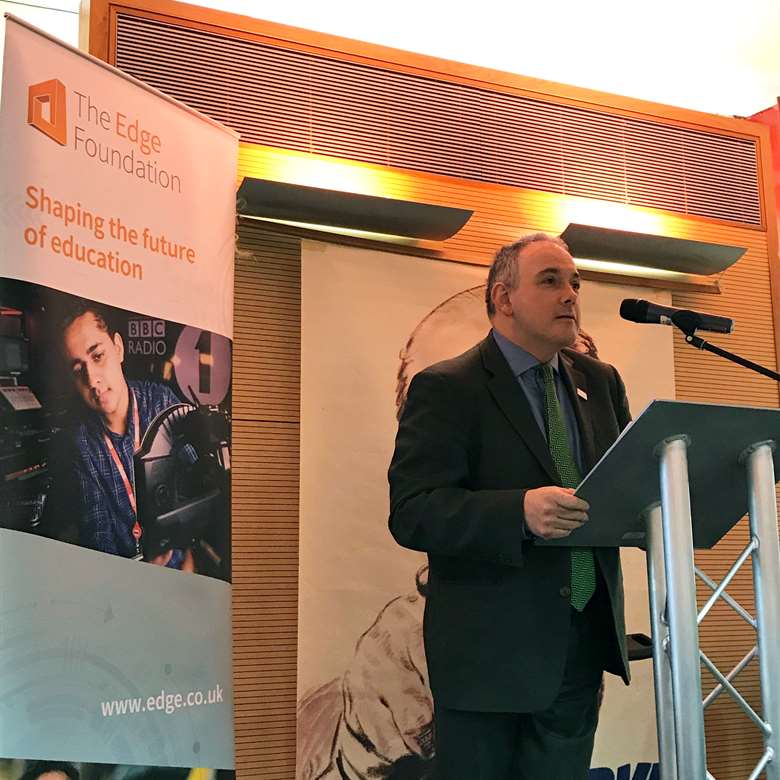Replace GCSEs with 'broad and relevant' baccalaureate, says MP
Gabriella Jozwiak
Monday, February 11, 2019
An influential Conservative MP has called for an overhaul of the school examination system so that pupils have a greater range of non-academic and vocational options by the age of 16.

Robert Halfon, chair of the commons education select committee, said change was needed because of a "complete disconnect between our education system and the 21st century world of work" - and called for GCSEs to be scrapped.
Speaking at a conference held by education charity The Edge Foundation, Halfon described how employers were struggling to employ young people who met their skills requirements.
He suggested GCSE exams, taken at age 16, had become little more than a "progress check", as since 2015 children have been required to stay in formal education and training up to age 18.
Halfon said curriculum changes such as the English Baccalaureate (Ebacc) had led to a decline in take-up of subjects that might help boost technical skills, which businesses say they want to see in new recruits.
"A huge emphasis has been placed through performance measures like EBacc on knowledge in a narrow range of academic subjects," added the MP.
"While businesses emphasise the need for technical skills, EBacc has delivered a 57 per cent reduction in design and technology GCSE entries since 2010.
"At the same time, the teaching of creative subjects needed to build broader communication and team-working skills have fallen by 20 per cent."
The MP added that he was not advocating for "either/or".
He continued: "The acquisition of core knowledge is important. But dry rote learning for exams is not the way forward and GCSEs have had their day."
Halfon said a baccalaureate exam taken at 18 would have a "broad and relevant curriculum that links explicitly to the real world and is assessed holistically".
- Analysis: Will the arrival of the EBacc boost young people's attainment?
- Special report: Apprenticeships
Under the new system, he proposed schools would be judged both on completion of the baccalaureate at 18 and the destinations of their pupils in the years after leaving, with apprenticeships counted as a "gold standard destination".
Halfon did not go into detail about how the baccalaureate would be composed, but an Edge Foundation report published in September 2018 proposed a similar system.
It suggested the qualification would include English; maths; two science GCSEs (one of which could be computer science); a creative GCSE such as art and design, music, dance or drama; a humanities GCSE such as history, geography or religious education and foreign languages; and a design and technology GCSE or approved technical award, such as one in construction.
At the time, Edge Foundation chief executive Alice Barnard, said that by 2050 the country would need more than three million additional skilled workers, but it lacked a strategy "to give young people the skills they need for the real world".
"It's not about ripping it all up and starting again, or about changing institutions, but we need to implement a broad and balanced curriculum which makes learning relevant to the workplace and equips young people for their working and broader lives," she said.
Halfon's idea was backed by fellow member of the education select committee Labour MP Lucy Powell.
Brave speech by @halfon4harlowMP today on reforming exams and curriculum for teenagers. He's right that much of what young people are tested on is from a different era, and we need to develop more skills. Rob thinks deeply about these issues and he should be listened to.
— Lucy Powell MP (@LucyMPowell) February 11, 2019
The National Education Union also welcomed the idea, describing it as "more suitable for modern times".
Kevin Courtney, joint general secretary of the union, said: "GCSEs were designed at a time when it was usual for students to leave school at 16.
"However times have changed and the education system should change to reflect this.
"As students are expected to remain in full time education or training until 18 the need for high-stakes qualifications at 16 does not exist."
Courtney added that such a change would need the "full involvement of the [teaching] profession".
But a Department for Education spokesman rejected the proposals, saying the department had already introduced reforms to GCSE that had made them more rigorous, and that they provided students with an appropriate platform for more specialised study post-16, including A-levels, T-levels and Level 3 vocational qualifications.
"The Education Secretary has been clear that we want children to be taught a broad and balanced curriculum and to explore the widest possible range of subjects to study," said the spokesman.
"That is why students are encouraged to study the EBacc subjects at Key Stage 4 and have the opportunity study a wide range of other GCSE or vocational qualifications alongside that.
"GSCEs are the gold standard qualification at age 16 and a passport to further study and employability - they were recently reformed so that their demand matches that in other high-performing countries and better prepare students for work and further study.
"We are also taking forward reforms from the Independent Panel on Technical Education to give students a clear choice between an academic or technical path at age 16.
"T-levels, alongside apprenticeships, will form the basis of our high-quality technical education offer."
In May last year, the government announced that T-level qualifications, which are on a par with A-levels but offer a choice between technical and academic education post-16, would be taught from September 2020.




